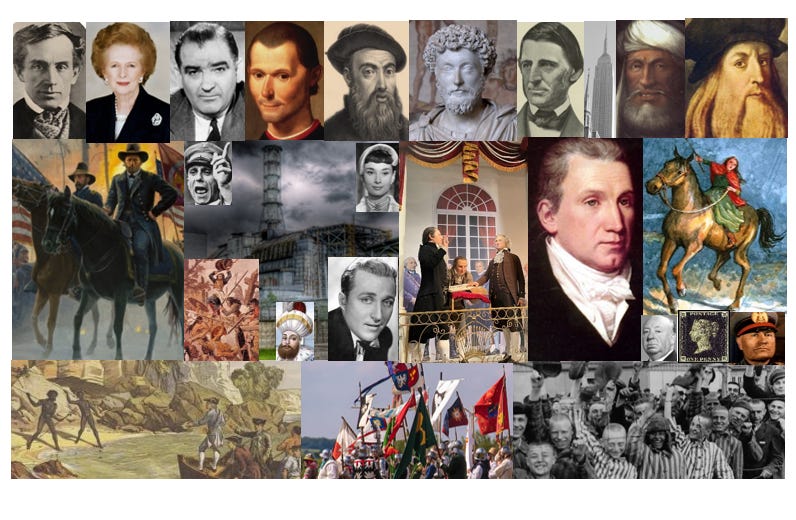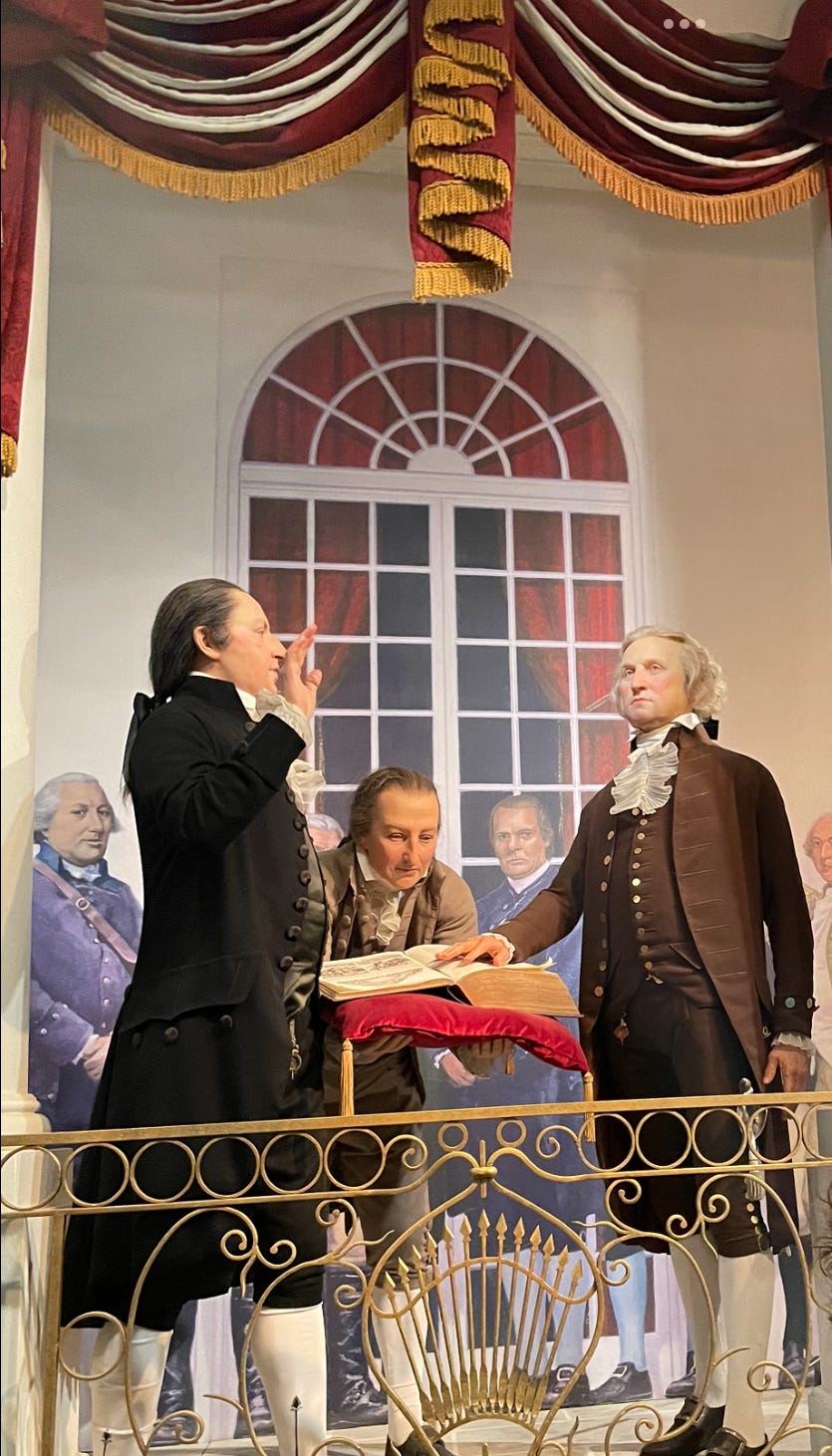History of the Week: Grant, Monroe, Chernobyl, Bing, Washington’s Inauguration, Morse, J.McCarthy, Thatcher& More

“The most effective way to destroy people is to deny and obliterate their own understanding of their history,” wrote George Orwell. That is why studying and understanding history is so vital both to individuals and to peoples. Below are some of the important events, births, and deaths that occurred this past week in history.
April 26
121 - Marcus Aurelius, Roman emperor and Stoic philosopher, is born.
1478 - The Pazzi (family) conspiracy fails to overthrow the Medici family that ruled Florence, though Giuliano de’ Medici was killed at Mass.
1777 - The 16-year-old Sybil Ludington, known as the female Paul Revere, makes her historic ride. “Ludington made her ride on April 26, 1777, during a driving rainstorm, traveling forty miles, and unlike Revere, avoiding capture. She learned that the British were planning to attack nearby Danbury, Connecticut the location of a stockpile of provisions for [the] Continental Army. Her father, Henry, was a Colonel in the militia in command of 400 men. …Ludington spurred her horse, prodding him with a stick to raise the alarm in Putnam County, New York. The British however were successful in their raid on Danbury, but roused by Ludington’s alarm, the Patriots encountered the British at nearby Ridgefield, Connecticut and were successful in driving them back to Long Island Sound.”
1865 - John Wilkes Booth, the actor, Confederate sympathizer, and virulent racist who assassinated Abraham Lincoln, is captured in a Virginia barn and killed.
1945 - Marshal Henri Philippe Pétain, head of the Nazi-controlled Vichy French government, is arrested for treason.
1970 - Melania Trump, First Lady as wife of Donald Trump, is born.
1986 - Date of the “Chernobyl disaster, accident in 1986 at the Chernobyl nuclear power station in the Soviet Union, the worst disaster in the history of nuclear power generation.”
1986 - Oscar-winning actor Broderick Crawford dies.
April 27
1521 - Portuguese mariner Ferdinand Magellan, who circumnavigated the globe by sea, dies.
1522 - Battle of Bicocca is a Spanish and Papal victory against French and Venetian forces.
1650 - Battle of Carbisdale: “a Royalist force commanded by James Graham, Marquis of Montrose, was heavily defeated by a Scottish Covenanter army led by Colonel Archibald Strachan at the Battle of Carbisdale.”
1791 - Samuel Morse, inventor of the telegraph, is born in Massachusetts.
1822 - U.S. Grant, the brilliant Union general who won the Civil War and America’s greatest civil rights president, is born. Read my full article on this great American.
1865 - The Sultana, carrying many Union POWs returning home, bursts into flames on the Mississippi River. “Researchers indicate that 1,195 of the 2,200 passengers and crew died, making the Sultana incident the deadliest maritime disaster in U.S. history.”
1881 - Elizabethgrad pogroms against Jews break out, eventually spiraling into 160 pogroms throughout Russia.
1882 - American poet and essayist Ralph Waldo Emerson dies.
April 28
1611 - Pontifical and Royal University of Santo Tomas, oldest university in Asia and largest Catholic university globally, is founded in the Philippines.
1758 - James Monroe, veteran of the American Revolution, Virginia Governor, minister to France and Great Britain, and U.S. president, is born. “The fifth president of the United States, James Monroe is known for his ‘Monroe Doctrine,’ disallowing further European colonization in the Americas.”
1789 - The famous Mutiny on the HMS Bounty, after which Capt. Bligh and 18 supporters were set adrift. Immortalized in a book and later movies (see below).
1945 - Benito Mussolini, the Fascist dictator of Italy whose government was one of the Axis powers during WWII, is executed.
April 29
1770 - Captain James Cook first lands in Australia and immediately encounters natives.
1864 - Battle of Gate Pa, a defeat for the British and a victory for the Maori in New Zealand.
1916 - The Irish Republicans’ Easter Rising for independence from the British ends as the Irish freedom fighters surrender to stop the bloodshed. The British executed the leaders of the rebellion as part of a harsh crackdown. Read my full article for more details.
1945 - “The 42nd and 45th Infantry Divisions and the 20th Armored Division of the US Army liberate approximately 32,000 prisoners at Dachau”, one of the most deadly Nazi concentration camps. Among the prisoners were about 43,000 political prisoners and around 22,000 Jews, but some 7,000 had been marched out by the Nazis that week, before Americans arrived.
1975 - U.S. troops begin the evacuation of Saigon, marking the end of U.S. involvement in the Vietnam War. The U.S. had won all the battles, but leaders decided to evacuate, abandoning the free Vietnamese to be massacred by the Communist Viet Cong.
1980 - Iconic and brilliant English movie director Alfred Hitchcock dies.
April 30
311 - Roman Emperor Galerius issues an Edict of Toleration ending persecution of Christians.
711 - Reportedly the date on which Tariq ibn Ziyad landed with Umayyad troops at Gibraltar to start the Muslim conquest of Spain.
1562 - French colonists under Jean Ribault reach Florida near Cape Canaveral, aiming to establish a French hold there.
1632 - Sigismund III Vasa, the king who unsuccessfully tried to unite Poland and Sweden, dies.
1789 - George Washington, the first and greatest U.S. president, is inaugurated in the then-capital of New York City. Washington took his oath of office with his hand on the Bible and then kissed the Bible. Read more details here.
1803 - The U.S. completes the Louisiana Purchase from France, doubling the size of America with a single purchase.
May 1
305 - Co-emperors of the Roman Empire Diocletian and Maximian retire from office. Diocletian did bring political and economic stability to the Empire but he also oversaw the most bloody and brutal persecution of Christians in Roman history. Maximian’s son and son-in-law (Constantine) would eventually go to war against each other, with the latter triumphing after using the Christian cross as his symbol.
1572 - Pope St. Pius V, who implemented the reforms of the Council of Trent, dies.
1707 - The Act of Union comes into force, uniting England and Scotland into Great Britain.
1840 - The “Penny Black,” the first postage stamp, is issued in UK.
1931 - The Empire State Building opens in New York, a mere 14 months after construction started. The now iconic skyscraper was the world’s tallest building at the time.
1945 - Joseph Goebbels, Nazi propaganda minister, commits suicide with his wife. They killed their own children first.
May 2
1519 - Leonardo da Vinci, the great Italian scientist, artist, inventor, musician, and all-around genius, dies in France. Read more about the ultimate Renaissance man here.
1660 - The Battle of Long Sault occurs in Canada, between the French with Huron and Algonquin allies and the Iroquois (who lost).
1945 - “German forces in Italy and Austria surrendered to Allied forces advancing northward through Italy” during WWII.
1945 - The Battle of Berlin ends as the German capital falls to the Soviets. The Allied decision to allow first entry to the Soviets was a disaster, and horrific reports of widespread and brutal gang rapes and other “unspeakable” crimes are told of the rampaging Soviets.
1957 - Joseph McCarthy dies. As the Republican senator from Wisconsin, his persistence in rooting out Communist spies who infiltrated the U.S. government led Communist sympathizers, both then and now, to accuse him of a crazed “witch hunt.” While “McCarthyism” is still used as an insult, McCarthy was absolutely right. Sadly, despite his patriotism and accuracy, his reputation has yet to be rehabilitated.
2011 - Navy Seal Team Six kills Osama Bin Laden, the high-profile Islamic terrorist who masterminded the devastating 9/11 attacks.
May 3
1469 - Niccolo Machiavelli, atheistic author of the influential pro-tyranny book “The Prince,” is born in Florence.
1481 - Muslim ruler Mehmed II, who conquered Constantinople from the Byzantines, dies.
1898 - Golda Meir is born. “Meir served as Israel’s first female Prime Minister through the turbulent period of the Yom Kippur War.”
1903 - Bing Crosby, most popular and iconic star of the Golden Age of Hollywood, is born. Read more about him here.
1906 - Mary Astor, an actress most famous for her role in The Maltese Falcon, is born.
1944 - Classic musical movie “Going My Way” premieres in New York, starring Bing Crosby and Barry Fitzgerald as two Catholic priests turning around a struggling parish. The movie won a whopping seven Academy Awards, for Best Actor (Crosby), Best Supporting Actor (Fitzgerald), Best Director (Leo McCarey), Best Picture, Best Writing Screenplay, Best Writing Original Motion Picture Story, and Best Song (“Swinging on a Star”).
1945 - Britain’s Royal Air Force (RAF), targeting Axis shipping in the Bay of Neustadt, launches an assault on the SS Cap Arcona. What the RAF did not know was that over 4,500 “evacuated” concentration camp prisoners were on board. In a massive disaster, 4,000 prisoners died and the event remains controversial to this day.
1947 - Japan’s post-war constitution goes into effect. In light of Japan’s horrific war crimes during the war, and the country’s attack on America while the latter was still neutral, it is unsurprising that the constitution stripped Emperor Hirohito of any real power, outlawed Japan’s “right” to make war, and provided a bill of rights, among other provisions.
May 4
1471 - The Battle of Tewkesbury ends with the decisive defeat of the Lancastrians and the victory of the Yorkists, the end of the second phase of the English Wars of the Roses.
1904 - The U.S. begins construction on the Panama Canal.
1929 - Belgian actress Audrey Hepburn, who carried messages for the resistance against Nazis during WWII, is born.
1979 - Margaret Thatcher becomes the first female British prime minister. Thatcher, the “Iron Lady,” “steered her country away from economic ruin, led the British to victory in the Falklands War, and was essential in standing up to the Soviet Union in the Cold War along with US President Ronald Reagan and Pope John Paul II. Thatcher’s strong opposition to the USSR helped sound the death knell for Communist control in Eastern Europe. Her belief in individual liberty, economic freedom, hard work, personal responsibility, and the necessity of free-market democracies standing up to aggression were so championed by her that the principles were dubbed ‘Thatcherism.’”
Did I miss any important events? Let me know in the comments.


